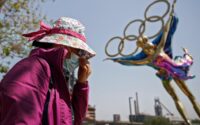Bahamas to lift quarantine restrictions for visitors on Nov. 1
No more drama in the Bahamas.
Bahamian authorities will soon lift a 14-day quarantine restriction for visitors if they can continuously prove that they are negative for the coronavirus amid the global pandemic.
Starting Nov. 1, tourists and returning residents will no longer need to isolate for two weeks upon arrival if they can present proof of a negative PCR test within a week of traveling, the Bahamas Ministry of Tourism and Aviation announced.
In a further step for health and safety, travelers must take a rapid antigen test upon arrival. From there, people who are staying longer than four nights and five days on the tropical islands must take a second rapid antigen test 96 hours after reaching the Bahamas.
After travelers provide proof of their negative PCR test, they are instructed to apply for a Bahamas Health Travel Visa; the cost of the visa will correlate with the length of their stay. The cost of the rapid antigen tests will also be included in the fee for the visa.
Anyone departing the Bahamas after five days will not be required to take the second antigen test, the tourism board said. Notably, kids age 10 and under who are visiting the Bahamas are exempt from getting tested for COVID-19 altogether.
“We are making changes to our travel and testing protocols in order to give our visitors a better and more seamless vacation experience,” Minister of Tourism Dionisio D’Aguilar told Travel + Leisure of the policy change. “We want everyone to enjoy The Bahamas thoroughly and with peace of mind. These new steps will allow us to closely monitor and respond to any potential spread of the virus, while our visitors can continue to have the authentic Bahamian experience they know and love.”
“With 16 islands to choose from, many that offer natural seclusion, we have something for everyone and look forward to welcoming travelers back to our shores,” he added.
When Bahamian tourism reopens on Oct. 15, all visitors must stay put and “Vacation in Place” for 14 days, or for the duration of their trip, before the new rule takes effect.
The island nation closed its borders to Americans in July following an uptick in coronavirus cases in the U.S.


